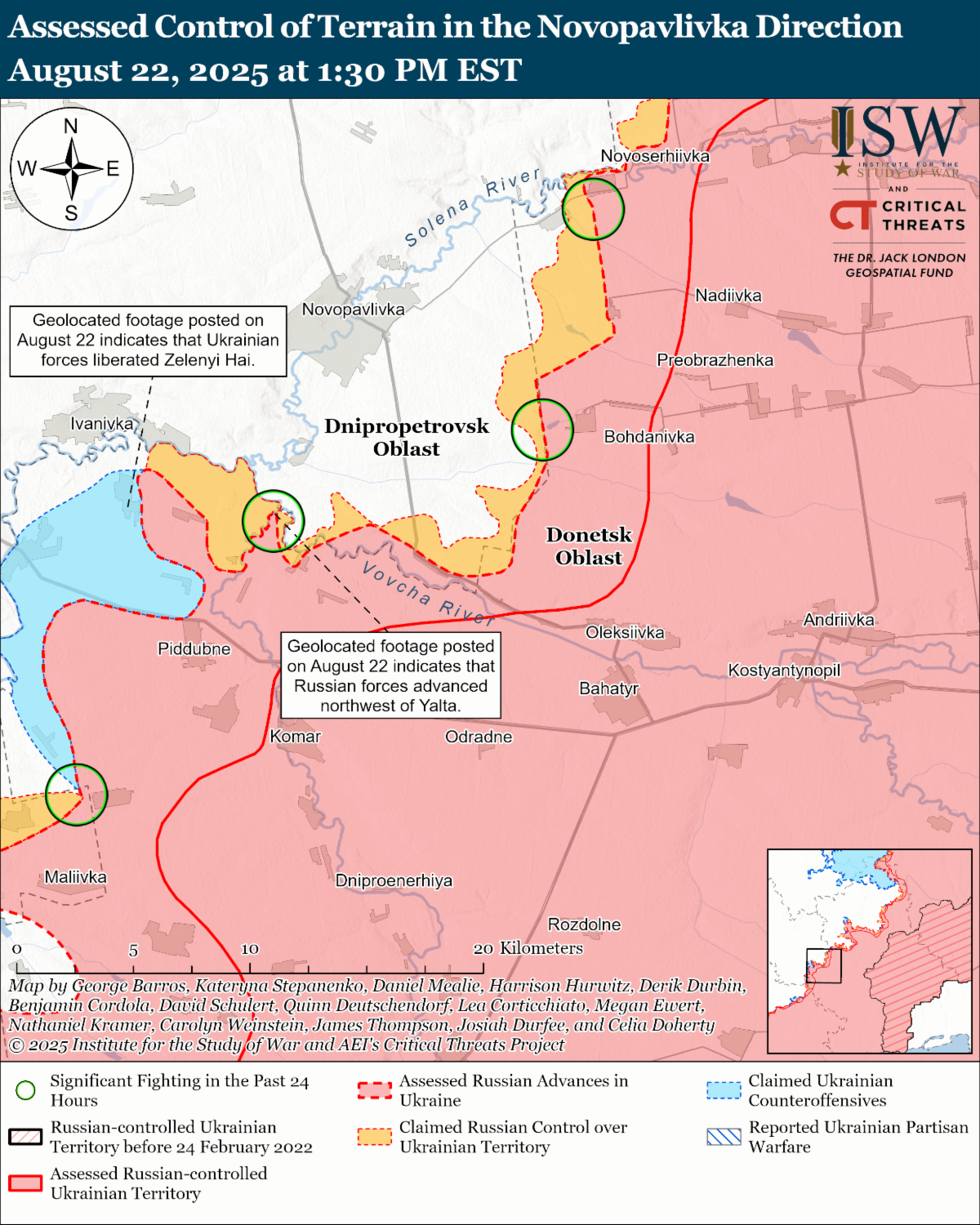The Kremlin continues to signal that Russian President Vladimir Putin is unwilling to have an immediate bilateral meeting with Ukrainian President Volodymyr Zelensky. Russian Foreign Minister Sergey Lavrov gave an interview to NBC on August 22 and reiterated that there is currently no plan for Putin to meet with Zelensky. Lavrov stated that Putin would meet Zelensky "when the agenda is ready for a summit," but noted that "this agenda is not ready at all." Lavrov accused Zelensky of failing to accept Russia’s demanded preconditions for negotiation, such as “discussion of territorial issues,” despite the fact that Zelensky stated on August 18 that he remains willing to meet with Putin unconditionally and directly discuss territorial questions. Putin notably rejected Zelensky's May 2025 invitation for the leaders to hold direct negotiations in Istanbul. The Kremlin has used Lavrov multiple times over the past few days to clarify the Kremlin's position that there will be no Putin-Zelensky meeting on the timeline that US President Donald Trump desires, and Lavrov's interview with a US-based media outlet likely aims to directly clarify this position to Western audiences.
Russian officials continue to deflect blame for the lack of a Putin-Zelensky meeting and Ukraine-Russia peace negotiations by rejecting the legitimacy of Ukraine's democratically elected government. Lavrov also asked on August 22 how Russia can meet with an individual “pretending to be a leader,” falsely implying that Zelensky is an illegitimate leader. Lavrov also questioned on August 21 Ukrainian officials' legitimacy and their eligibility to sign a peace agreement with Russia. Other Russian officials, including State Duma International Affairs Committee First Deputy Head Alexei Chepa, State Duma International Affairs Committee Deputy Head Andrei Klimov, and State Duma Defense Committee First Head Chairperson Alexei Zhuravlev also rejected Zelensky's legitimacy and questioned the legality of any peace agreement that Zelensky would sign. Russian officials have repeatedly denied and undermined the legitimacy of Zelensky’s presidency in an ongoing effort to justify Russia’s war against Ukraine, portray Zelensky as a false actor in peace negotiations, and deflect from Russia’s ongoing refusal to participate in negotiations. Lavrov and other Russian officials' claims about Zelensky's illegitimacy also set informational conditions for Russia to reject the legality of any peace agreement Russia may sign and justify Russia's reneging on such an agreement in the future.
Ukraine continued its strike campaign against the Russian military and oil infrastructure in Russia and occupied Ukraine. Ukrainian Unmanned Systems Forces Commander Major Robert "Magyar" Brovdi reported on August 21 that Ukrainian drones struck the Unecha oil pumping station northeast of Vysokoye, Bryansk Oblast, which is part of Russia’s Druzhba pipeline and plays a key role in supplying Russia’s military-industrial complex. Geolocated footage published on August 21 shows a Ukrainian strike on one of the Unecha station's oil pumps and a large fire. Ukrainian forces most recently struck the Unecha facility overnight on August 12 to 13. The Ukrainian General Staff reported on August 22 that Ukrainian missile, artillery, and aviation launched coordinated strikes on a command post of the Russian Rubikon Center for Advanced Unmanned Technologies and a large ammunition depot in occupied Donetsk Oblast. Geolocated footage from the Ukrainian General Staff published on August 22 shows the Ukrainian strike against the Rubikon command post and ammunition depot east of occupied Novotoretske, Donetsk Oblast (northeast of Pokrovsk). The Ukrainian Navy reported on August 22 that the Ukrainian Navy struck a Russian drone base at the Khersones Airbase west of occupied Sevastopol, Crimea, hitting up to three Iranian Mohajer-6 drones and two Forpost reconnaissance drones that the Russian military uses to monitor the Black Sea. | 




 [ISW] 러시아 공세 캠페인 평가, 2025년 8월 22일
[ISW] 러시아 공세 캠페인 평가, 2025년 8월 22일
 [ISW] 러시아 공세 캠페인 평가, 2025년 8월 22일
[ISW] 러시아 공세 캠페인 평가, 2025년 8월 22일